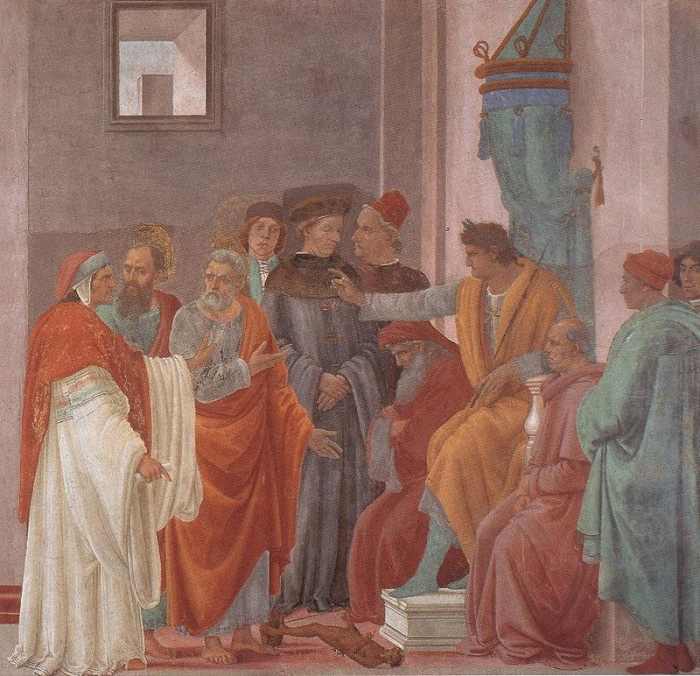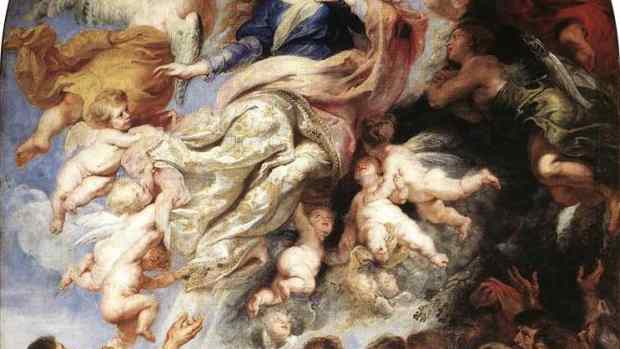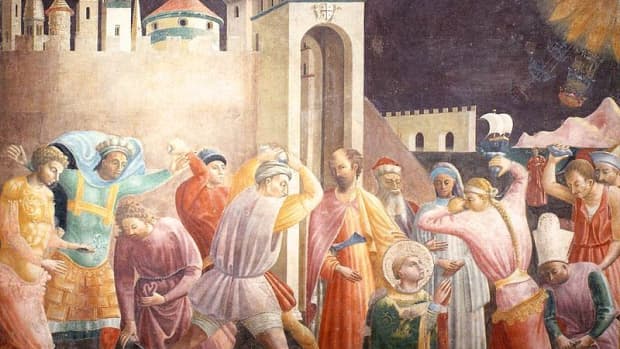What Did Irenaeus Believe About Apostolic Tradition?
The Apostolic Tradition
It is a pivotal doctrine of the Roman Catholic Church that tradition—defined as unwritten teachings passed along from the apostles to their successors even to this day—is as necessary for the proper understanding of the faith as the Scriptures.*
This position is vigorously defended by a historical appeal to the early church fathers, who are said to have universally affirmed the need for tradition. Chief among these witnesses is the second-century writer and elder, Irenaeus.** To demonstrate Irenaeus’ stance in favor of the need for apostolic tradition, apologists for the Roman Church turned primarily to the church father’s iconic work Against Heresies, specifically Book 3.
Of particular importance are passages such as one found in chapter three, section three, which reads:
"In this order, and by this succession, the ecclesiastical tradition from the apostles, and the preaching of the truth, have come down to us. And this is most abundant proof that there is one and the same vivifying faith, which has been preserved in the Church from the apostles until now, and handed down in truth."
In making this claim, however, Roman Catholic apologists decontextualized Irenaeus’ words to the point of not merely contradicting him but turning his whole argument completely on its head.
Against Heresies in Context
In the late second century, Irenaeus saw the church faced with the explosive growth of a set of heretical sects collectively known as Christian Gnostics – who effectively blended the concept of Greco-Roman pantheons with figures, names, and terms important in the Christian scriptures. In order to equip his fellow elders to combat their claims, he wrote Against Heresies, a five volume work endeavoring to define, explain, and refute the Gnostics’ claims.
Among the arguments which Irenaeus had to confront was the claim that, in order to properly understand the scriptures, one had to interpret them by traditions which were not written, but passed along by living voice.
"When, however, they are confuted from the Scriptures, they turn round and accuse these same Scriptures, as if they were not correct, nor of authority, and [assert] that they are ambiguous, and that the truth cannot be extracted from them by those who are ignorant of tradition. For [they allege] that the truth was not delivered by means of written documents, but by living voice…"3
Interestingly, this is exactly the claim that Rome makes in defense of its appeals to Apostolic Tradition. Irenaeus, however, explicitly denied this.
In book two of Against Heresies, he wrote: "…the entire Scriptures, the prophets, and the Gospels, can be clearly, unambiguously, and harmoniously understood by all, although all do not believe them…"4
And in Book three: "We have learned from none others the plan of our salvation, than from those through whom the Gospel has come down to us, which they did at one time proclaim in public, and, at a later period, by the will of God, handed down to us in the Scriptures, to be the ground and pillar of our faith.5"
Despite being a generation removed from the Apostles, Irenaeus did not attribute his understanding of the faith to an Apostolic tradition, but rather to nothing other than the scriptures given to the church by the apostles and their companions: Matthew, Mark, and Luke5.

It was the Gnostics, not Irenaeus, who claimed tradition was necessary to understand the Scriptures properly.
Filippino Lippi - The Apostles Confront Simon Magus - Public Domain
Apostolic Succession
But Irenaeus knew an argument over who held claim to a superior tradition was one he could win, and he was determined to force his adversaries into a corner, not allowing them to have any means of clinging to a corrupted interpretation of the scriptures.
Recommended
"…[They endeavor] like slippery serpents to escape at all points. Wherefore they must be opposed at all points, if perchance, by cutting off their retreat, we may succeed in turning them back to the truth.6"
For this reason, and no other, he turned his attention to the topic of the Apostolic Succession of presbyters throughout the churches as proof that there is no contradicting tradition handed down in secret to a select few.
"It is within the power of all, therefore, in every Church…to contemplate clearly the tradition of the apostles manifested throughout the whole world; and we are in a position to reckon up those who were by the apostles instituted bishops in the Churches, and [to demonstrate] the succession of these men to our own times…For if the apostles had known hidden mysteries, which they were in the habit of imparting to 'the perfect' apart and privily from the rest, they would have delivered them especially to those to whom they were also committing the Churches themselves.7"
Is Apostolic Tradition Necessary?
Here we must make special note of a single word used by Irenaeus in the above passage – "If." If the apostles had imparted some teachings privately, surely it would have been imparted to those who they appointed as bishops in all the churches. Irenaeus does not accept that there is any such unwritten tradition, he simply demonstrates that if there was, the church would possess it.
After presenting a list of the bishops of Rome (since it would be too cumbersome to present all the lists of all the churches8), and the bishop Polycarp as examples of Apostolic Succession, Irenaeus asks a hypothetical question:
"Suppose there arise a dispute relative to some important question among us, should we not have recourse to the most ancient Churches with which the apostles held constant intercourse, and learn from them what is certain and clear in regard to the present question? For how should it be if the apostles themselves had not left us writings? Would it not be necessary, [in that case,] to follow the course of the tradition which they handed down to those to whom they did commit the Churches?9"
Why would the church be forced to resort to tradition? Only if the apostles had not left writings. Apostolic succession throughout the churches of the world is evidence that the orthodox faith is not a new invention, but it is not necessary to understand the true faith as long as the writings of the apostles are available.
When Apostolic Tradition Is Necessary
It should be abundantly clear at this point that Irenaeus’ appeal to Apostolic tradition was simply to refute a Gnostic claim to some superior, secret tradition, not a conviction of his own that such a tradition was necessary. Nevertheless, to refute them fully, and demonstrate that if such a tradition was necessary it would be the churches founded by the Apostles that possessed it, he finally turns to the one group of people to whom such a tradition is truly necessary – those who do not have the scriptures.
"To [having no Apostolic writings] many nations of those barbarians who believe in Christ do assent, having salvation written in their hearts by the Spirit, without paper or ink, and, carefully preserving the ancient tradition…Those who, in the absence of written documents, have believed this faith, are barbarians, so far as regards our language; but as regards doctrine, manner, and tenor of life, they are, because of faith, very wise indeed; and they do please God, ordering their conversation in all righteousness, chastity, and wisdom."
This one group relies on tradition, and to Irenaeus, this demonstrated that the purity of the churches was sound throughout the world. Having sufficiently answered the claims of the Gnostics, Irenaeus then returned to the scriptures which were his source of knowledge of the faith:
"Since, therefore, the tradition from the apostles does thus exist in the Church, and is permanent among us, let us revert to the Scriptural proof furnished by those apostles who did also write the Gospel."11
Conclusion
Read in his context, it is evident that Irenaeus in no way felt an Apostolic Tradition was necessary to properly understand and expound upon the written Scriptures. Apologists who use isolated quotations from Against Heresies to affirm such a stance strip all context from his words in such a way that it is difficult to fathom how such an error could be honestly made.
The Roman position that Apostolic Tradition is necessary to properly understand Scripture is identical to the claims of the Gnostics which Irenaeus set out to refute, yet his refutations somehow have been turned upside down to be presented as a ringing endorsement for the need for tradition!
As for how Irenaeus believed we should approach the scriptures, and what he believed was the key to understanding them properly, it is best to allow him to speak for himself:
"If, however, we cannot discover explanations of all those things in Scripture which are made the subject of investigation, yet let us not on that account seek after any other God besides Him who really exists. For this is the very greatest impiety. We should leave things of that nature to God who created us, being most properly assured that the Scriptures are indeed perfect, since they were spoken by the Word of God and His Spirit; but we, inasmuch as we are inferior to, and later in existence than, the Word of God and His Spirit, are on that very account destitute of the knowledge of His mysteries…
"If, therefore, according to the rule which I have stated, we leave some questions in the hands of God, we shall both preserve our faith uninjured, and shall continue without danger; and all Scripture, which has been given to us by God, shall be found by us perfectly consistent; and the parables shall harmonize with those passages which are perfectly plain; and those statements the meaning of which is clear, shall serve to explain the parables; and through the many diversified utterances [of Scripture] there shall be heard one harmonious melody in us, praising in hymns that God who created all things.12"
Suggested Reading
To fully appreciate the sweep of Irenaeus’ arguments, it is best to simply read his work. However, since this is not always easy to do, and much of Against Heresies can be tedious and bewildering to one not interested in learning all the painstaking details of Gnostic theology, I would at least refer the reader to Against Heresies, Book 2, chapters 27-28 and Book 3, chapters 1-5^.
Footnotes and Bibliography
* "…it is not from sacred Scripture alone that the Church draws her certainty about everything which has been revealed. Therefore both sacred Tradition and sacred Scripture are to be accepted and venerated with the same devotion and reverence." – Second Vatican Council, Dei Verbum1
** "Saint Irenaeus stands out as a Church Father who stresses the need for Apostolic Tradition…Irenaeus stressed that the Catholic Church maintained a true 'apostolic succession' and thus the true 'apostolic tradition'. In other words, Irenaeus appealed to a dogmatic lineage. The Scriptural texts don’t float out there for just anyone to interpret. Rather, they belong to the Church and remain in that context."2
^ Irenaeus’ Against Heresies, Schaff Translation, https://www.ccel.org/ccel/schaff/anf01.ix.iii.xxviii.html
1. https://www.catholic.com/tract/scripture-and-tradition
2. Dr. taylor Marshall - https://taylormarshall.com/2008/08/saint-irenaeus-on-need-for-tradition.html
3. Against Heresies, Book 3, chapter 2, Section 1
4. Against Heresies, Book 2, chapter 27, section 2
5. Against Heresies, Book 3, chapter 1, section 1
6. Against Heresies, Book 3, chapter 2, section 3
7. Against Heresies, Book 3, chapter 3, section 1
8. Against Heresies, Book 3, chapter 3, section 2
9. Against Heresies, Book 3, chapter 4, section 1
10. Against Heresies, Book 3, chapter 4, section 2
11. Against Heresies, Book 3, chapter 5, section 1
12. Against Heresies, Book 2, chapter 28, section 2-3
Comments
B A Johnson (author) on December 05, 2019:
Tony Muse, it is certainly my pleasure, thank you very much!
Tony Muse from Texas, USA on December 05, 2019:
Very well written, thank you for work on this topic.









